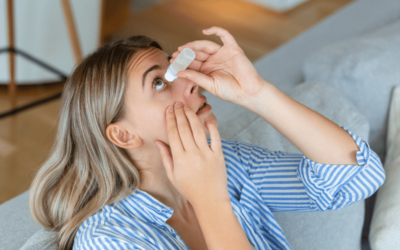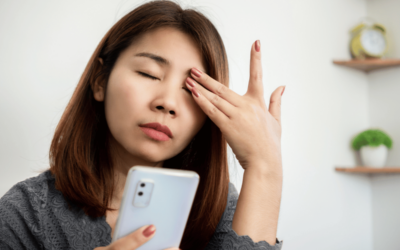Dry eyes can be a hassle, especially when they disrupt your daily routine. You might already know that dry air or not drinking enough water can lead to dry eyes, but did you know your medication could also be a culprit? It’s true! If you’ve recently started a new prescription and your eyes have been feeling dry, your medication might be contributing to the problem. Learn how certain medications can affect your eyes and what you can do to find some relief.
How medications can cause dry eye
Many medications have side effects, and dry eye is a common one. Here’s how different types of medications can lead to dryness:
Antihistamines
If you use antihistamines for allergies, colds, or hay fever, you might have noticed your eyes feeling dry. These medications are great at blocking the histamine that causes sneezing and a runny nose, but they can also dry out your eyes. They reduce overall moisture in your body, including the moisture needed to keep your eyes comfortable.
Antidepressants and anti-anxiety medications
Antidepressants and anti-anxiety meds, like SSRIs and benzodiazepines, help manage mood and anxiety disorders, but they can also affect tear production. These medications can disrupt the balance of chemicals in your body that help regulate tears, leading to dryness and discomfort in your eyes.
Blood pressure medications
Some blood pressure medications, especially diuretics (often called “water pills”), can cause dry eyes. Diuretics increase urine output, leading to dehydration throughout your body, including your eyes. Less moisture means your eyes may not produce enough tears, which can leave them feeling dry.
Decongestants
Decongestants help relieve stuffy noses and sinus congestion, but they can also dry out mucous membranes, including those in your eyes. If you use decongestants regularly, you might notice that your eyes feel drier than usual.
Hormonal medications
Hormonal medications, such as birth control pills and hormone replacement therapy, can impact your body’s hormone levels and, subsequently, tear production. Changes in hormones, especially estrogen, can affect the meibomian glands in your eyelids (which produce the oily layer of your tears), leading to dry eye symptoms.
Acne treatments
For those using medications like isotretinoin (e.g., Accutane) to treat severe acne, dry eyes can be a common side effect. Isotretinoin decreases oil production in the skin, which can also affect the oil that helps keep your eyes moist.
Other medications
Other types of medications might also contribute to dry eyes. If you take medication for a chronic condition, be sure to check if dry eyes are listed as a side effect. It’s also a good idea to talk to your healthcare provider if you suspect your medications are causing your symptoms. They may suggest taking a different medication or adjusting your dosage.
In addition to working with your primary care provider, the eye doctors at Northwest Hills Eye Care have experience diagnosing dry eyes and can recommend effective treatments tailored to your needs. With the right approach, you can find relief and get back to feeling your best. Contact us today to schedule an appointment with our optometrists in Austin, Texas.



